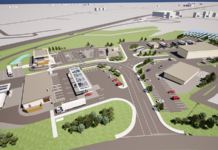
THE RICS Construction & Infrastructure Market Survey for Q2 in Scotland has predictably shown a slump in activity in the midst of the Covid-19 pandemic.
43% more contributors in Scotland reported a decline rather than rise in workloads. This includes 13% more respondents reporting a fall in private housing workloads, marking the first fall since 2016. A decline in output was also reported across public housing and the other public works categories.
There was also a decline in infrastructure workloads with 53% more contributors in Scotland reporting a fall than a rise during Q2, the biggest decline since 2009.
17% more Scotland-based surveyors said they expect workloads to decline rather than rise over the next year, with respondents also expecting profit margins to be lower in 12 months.
Neil MacDougall MRICS of Diamond & Co in Glasgow said, “The practical implications in the event of redundancies upon completion of the furlough scheme may see firms understaffed with skill shortages in some areas.”
Hew Edgar, RICS head of government relations said, “Historically, the Scottish Government has recognised the beneficial impact of fiscal stimuli for construction and infrastructure, and its recognition of the sectors’ contribution to kickstarting the post-Covid recovery and the wider economy is welcome. In addition to long term capital, there are non-financial initiatives and schemes that the government can make to boost construction and infrastructure activity, such as support for innovation, and continued streamlining of planning as the sector battles Covid.
“While the survey shows the inevitable impacts of Covid, it also cites barriers to construction that could be removed with a bit more impetus and innovation from government.
“RICS’ past suggestion of a new land classification of Amberfield is ready to go land, identified by local authorities and communities as favourable for development in line with local needs. It would reduce costs for developers including local authorities and enable SMEs and self/custom builders to generate homes at speed. Lifting this particular barrier could even go some way to representing that mythical silver bullet as it would address multiple concerns cited in the survey including planning delays and the drop in housebuilding, as well as spawning activity in the supply chain and thereby easing materials shortages.
“We’d also like to see further support for modular housing, which has the potential to be a star contributor to activity, with the added bonus of positively impacting green targets and product quality.”
Simon Rubinsohn, RICS chief economist commented, “A weak Q2 survey was only to be expected given the impact of the pandemic on the construction sector. Slightly more ominously, forward looking indicators are also still fairly cautious, apart from the infrastructure sector which should benefit from recent government initiatives.”








